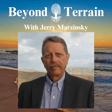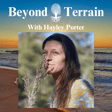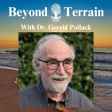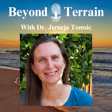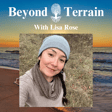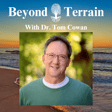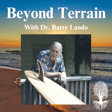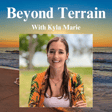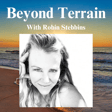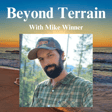Introduction to Eat Raw Meat and the Primal Diet
00:00:02
Speaker
What's going on everybody beyond terrain here for another episode. Uh, we've got episode eight. We got eat raw meat today. Uh, look forward to this episode. Eat raw meat has been on the raw problem lab for five and a half years now. Um, going strong and, uh, it's a fountain of knowledge on this subject. So I'm really looking forward to today's conversation. We're going to get into the diet, get probably get into some other things too. So we'll see how this goes. I want to thank you for being here.
00:00:30
Speaker
Sure. Uh, thank you. I'm glad to be here. I think, uh, what you're doing with your podcast is important. Um, you know, speaking about, uh, these topics about terrain theory, the more people we have doing that, obviously the more eyes and ears it gets to. So, uh, yeah, happy to happy to help. Definitely. Yeah. Yeah. Well, I really like, uh,
Defining Health: Mind, Body, and Spirit
00:00:56
Speaker
how the primal diet fits in it because I feel like it is centered around this model of living with nature and not against it and doing what's natural. I really like this perspective and I think it works really well for it. All of my learning has led me here.
00:01:15
Speaker
So I like to ask my guests at the start of the podcast. I like to kind of get them to define what health means to them and how it looks like. And so we have a little baseline and we can work from there. So if you don't mind, just kind of give your definition of what health is and what that looks like for you. Well, I think in terms of health, there's, you know, several components and I saw
00:01:40
Speaker
some of Wes and Derek's you know interviews and I think they did a pretty good job encapsulating that you know it's not just about you know what you're eating you know obviously that's a part of it but it's also uh you know your your mental and I guess you could say a spiritual uh sort of components as well uh which aren't necessarily corrected by
00:02:03
Speaker
just doing a specific kind of diet. I've been pretty lucky myself you know the biggest health problems that I've had were pretty severe eczema and I have tinnitus as well and you know that's you know the eczema you can see it's like something's wrong with somebody but with tinnitus you know it's kind of like
00:02:29
Speaker
You can't see, you don't know if somebody has it. And it's kind of difficult because it can stretch you out and you want to avoid certain environments, maybe with noise or certain professions. But I think, you know, I'm grateful for the health that I do have and I'm working on, you know, improving my health with the Primal Diet. I do work outside in the summers, so I do stay active that way.
Personal Health Journey: Overcoming Eczema
00:02:57
Speaker
So I think exercise is important, even if it's just a little bit like as much as you can. So I think, you know, being, being content with where you're at, I think is a pretty good picture of health. And that might seem pretty general and subjective, but I think for someone to ascribe, you know, a perfect objective kind of health, I think, I don't really know if that's quite possible in this day and age, because
00:03:27
Speaker
So many people, especially people who are on the primal diet, they're very fixated on 40 years or 20 years or whatever to completely detox and then rebuild your body, and then you can have perfect health. With the amount of pollution from the pharmaceutical industry, choosing my words carefully,
00:03:50
Speaker
I think people, you know, I don't know if people will actually really have perfect health. I think you can have really good health.
Realistic Health Expectations
00:03:57
Speaker
Don't get me wrong. I'm not being pessimistic, but I think, um, you know, don't let, don't let, uh, perfect be the enemy of, you know, good enough, so to speak. So I, uh, I, I don't think I'll ever fully detox. I've had, you know, 50, uh, you know, of those things. And I don't really know.
00:04:21
Speaker
And people ask me, you know, how are you still alive? I'm like, the skin on my teeth, I suppose, just have a strong constitution, a strong body. And, you know, it's like, I'll probably never get all that out of my system. And I'm okay with that. I just got to try to live the best life I can and reduce exposure to things that are not good for you. You know, I don't drink, I don't smoke.
00:04:47
Speaker
I don't really touch tap water except to wash my dishes. I use the bath formula for the hot baths, so I neutralize a lot of the poisons in there. When I'm working, I paint a lot, so I wear respirators, so work safety is really important. You wear some face protection for your eyes, some goggles, a face shield, a respirator for doing all kinds of things.
Industrial Environment Safety
00:05:15
Speaker
If you're around cleaning solutions,
00:05:17
Speaker
around pain if you're around epoxy you know whatever it's always good to have something like a respirator with you on hand because let's say you know there's a car accident there's a lot of smoke or a spill and there's fumes and you don't have anything to protect yourself with so I always preach you know work safety and investing in things that can help you protect against some of those obstacles and challenges in our industrial environment so I think you know kind of
00:05:47
Speaker
leading a stray there. But yeah, I mean, just in terms of health, it's kind of like whatever's, you know, kind of working for you. If you know it's not working for you and you're living in denial, you know, that's your choice. Everybody has to make their own choices. And it's kind of hard to, you know, I don't want to judge or chastise anybody for their choices necessarily. My loved ones, I might say something too, because, you know, I care about them. I think, you know, if it's your loved ones, you might have a responsibility. But like, I know
00:06:16
Speaker
I use this example a lot. I know two vegans, well, actually three, but the two I know are brother and sister. They were raised without pharmaceuticals, without anything, very low-tox lifestyle, and they were raised vegan. I'm pretty sure they were aggressive, but they're vegan, and they're really
Components of the Primal Diet
00:06:35
Speaker
healthy people. And they talk to me about how they interact with people who have had those pharmaceuticals, how people just don't seem right.
00:06:44
Speaker
And they're like, well, you know, we got to be patient. But one of them, he plays a college baseball for like a D three school. He's a pitcher or something. And, you know, you always hear about, oh, vegans, you know, they never, they never make it. They're not healthy. But, you know, I know these two people and they're healthy. And I know an older fellow who's in the sixties who's been mostly vegan this whole life, never had any pharmaceuticals in his life. A pretty great guy, pretty, pretty healthy guy. Um, so again, you know, like I said, there's more to
00:07:13
Speaker
being healthy than just what kind of diet you're on, you know, mitigating your exposure to bad things is very important. It's probably even more important. And that goes with mental stress too, right? I mean, that's a stress is a big thing. I was watching a National Geographic documentary about chimpanzees or no, it was about stress and they were studying chimpanzees and they found that certain chimps are
00:07:41
Speaker
whatever primates they were looking at had a hierarchy and the lower hierarchies had more stress and their arteries were clogged because of a corto somethingroids that are produced from the adrenaline and the stress and that led to hardening of the arteries. It wasn't a diet related thing. It's a stress related thing. They didn't find that in the primates in the higher hierarchy. So, you know, you got to kind of look at it from all angles. Yeah.
00:08:11
Speaker
Well, it is a little bit of an abstract question, but you did a great job answering it in my opinion. I agree with pretty much everything that you said there. So, you know, it's kind of a central thing at this point, every person that's come on, it's always more than died. And like you said, like there are people out there, even though they are on a RAV, you can die it, they do quite well for themselves. Like there's this one fella actually when I was getting into kind of the terrain model of health and
00:08:40
Speaker
It was John Rose and he's been raw vegan for a very, very long time and he talks about how germs don't cause disease and doesn't take pharmaceuticals and minimizes pollution and in his mind, maximizes energy and nutrients through his food. He eats the raw vegan diet and he does quite well for himself. He's in his 60s now and he's cut with a six pack, whatever, if that's an indication of health, I don't know. But it's funny how it's like,
00:09:10
Speaker
It's more than just diet. I do think that diet does play that role, too, and being able to help see clearly. I think if anything, it really, for me, comes down to minimizing toxins and maximizing nutrients. I will say, I do think that a more raw, animal-based diet is more conducive for
00:09:37
Speaker
nutrient intake for sure. I think it's kind of objective, but it's hard to discount these other people.
Literature on the Primal Diet
00:09:44
Speaker
So I guess we can get into, what does the primal diet look like for you? And even beyond diet, like you mentioned hot baths or things like that. So what is the primal lifestyle? Well, I can give a little bit of a facetious answer, but I think I won't.
00:10:07
Speaker
Basically, if you want to know about it, I suggest you read the books. Um, you can find them on Amazon. You can find them on, uh, the primal diet or primal diet.net. And, uh, those are, you know, that's where I would go. Um, but essentially those are, those are, uh, genus, bond or planets books, right? Yes. They're correct. You mentioned, yeah. I'm just fond of planets. He created the primal diet through his years of research and experimentation.
00:10:37
Speaker
on himself and clients, and he writes all about it, and we want to live, and the recipe for living without disease. We Want to Live is more of a narrative-based book, which does have a lot of good information in the backend. I find the narrative, you read it once, it's okay, but rereading it, it's kind of like, it's a little cheesy, a little cliche, but I mean,
00:11:01
Speaker
There's some good information in there, you know, especially when he's dealing with his son or some of his other clients, certain food combinations, you know, that are very, I think, useful, that might get overlooked. And every time I read the book, I always see something new. And when you're on the diet, your needs change. So you can't have a static diet, right? So you might start out with eating a set of
00:11:27
Speaker
you know, some things, you know, in terms of the meat,
Adapting the Diet to Personal Needs
00:11:31
Speaker
the eggs, the dairy, vegetable juice, you know, after a couple of years, you may need to make adjustments to that the time kind of meat you're eating, the ratios and the kind of vegetable juice you're having, the frequency of cheese, the amount of eggs, all that is very dependent on what your body's healing and detoxing. So, you know, it definitely isn't a static diet.
00:11:54
Speaker
And it does take a lot of self knowledge and self care and reflection. Nobody knows their own body like you. So if you have a good idea of your medical history and your problems, you can pretty much figure out what you need to do when you should be doing it and listening to your intuition when things don't feel right or they start to stagnate. So essentially, you know, there's a big eating schedule that's a recipe for living without disease.
00:12:22
Speaker
And, uh, it's called the general daily recommended schedule. And it starts off with, you know, vegetable juice in the morning when you wake up, uh, several ounces or so to maybe a cup or so. And, uh, then eggs, um, preferably, and then you would wait an hour. So you would eat your raw meat about a half pound to a pound. And then after that,
00:12:51
Speaker
you would have, you could have like a lubrication formula or something and you'd wait. You know, there's some spacing, which I think is pretty important between vegetable juice and the meat. You definitely don't want to mix those because you can get a stomach ache. It'll reduce the the effectiveness of the digestion.
Daily Eating Schedule
00:13:11
Speaker
So, you know, wait an hour before meat with vegetable juice and then after meat, wait two hours for vegetable juice and
00:13:20
Speaker
you're going to consume a milkshake or something I'd wait 45 minutes after meat and basically you just kind of repeat that segment throughout the day you know you would have more vegetable juice after your your lubrication formula or whatever and then you'd have more meat and then you could have more vegetable juice or you could have like a lubrication formula or a milkshake you know essentially
00:13:46
Speaker
lube formula and the milkshake where you get a lot of the raw fat which is very important on the diet then you want to eat like a tablespoon minimum of raw fat to three tablespoons or more of fat with a meat meal so your your body's using the energy of the fat instead of the meat because you want the meat to be used for cellular regeneration that's something that's only going to happen with the meat so that's that's an important indication or point distinction there
00:14:15
Speaker
Eggs throughout the day. You can never have too many eggs That's in the book and one thing that's changed is the raw unsalted cheese Which is cheese that hasn't been heated above cow temperature that is made without salt and Ideally you want to eat that the first thing when you wake up to absorb everything that's dumped into your stomach overnight sometimes I find myself waking up at night and
00:14:41
Speaker
Excuse me. And, uh, eating cheese. Cause I have some indigestion, but on my eggs or some milk, and then I'll get back to sleep. Um, because after about five hours, you know, your body starts to go into autophagy fasting and you'll consume your red blood cells. And you know, you do that, you wake, I know I wake up with, um, pretty good energy. You know, I was never a big caffeine guy, but it always kind of made me, uh, very anxious, very jittery, very agitated.
00:15:10
Speaker
I made me feel kind of ill the next day. But now, you know, since I've been doing the diet, I don't really, you know, I have energy, I can wake up, I'm ready to go. I don't need to have my coffee, I don't need to have a tea or anything. So that's a, that's a pretty big advantage of the diet. And then as you mentioned, non diet components, which would be like the hot baths. Technically, you could say it's part of the diet because anything you put on your skin, you absorb into your body.
00:15:39
Speaker
So like when you're putting in the ingredients, if you have municipal water, the tap water, putting in what I recommend now is four cups of milk and that could be mostly skim. So like I buy a gallon, I skim most of the cream. I'll leave a little bit on there. I separate into three quarts and then I'll put a quart in the tub. I do about half a cup or so, half a cup or less about of apple cider vinegar.
00:16:09
Speaker
And then I use dead sea salt. I prefer sun-dried dead sea salt. Any sun-dried sea salt is fine, but I just prefer using dead sea salt because that's a higher mineral concentration. The salt helps to neutralize some toxins and pull stuff out of the body. It also helps keep the water warm. The apple cider vinegar helps neutralize the acidic metals, the milk neutralizing the alkaline metals. The milk also feeds the skin.
00:16:40
Speaker
So that's why I just say anything you put on your skin. The motto I have is if you wouldn't put it on your skin, don't put it in your body. Or if you wouldn't put it in your body, don't put it on your skin. So for me, when I'm painting, I'm pretty good now, but if I get paint on me, I wash it off immediately. Usually I get it on the gloves or my shirt. It's not a big deal, but it's important to think about that. Even if you still use or around, depending on someone's
00:17:09
Speaker
you know, if you live with parents or you have roommates, like these industrial kind of cleaners, you know, you just kind of have to watch out, you know, if you get them on your skin, it's not good, you should wash it off or try to avoid it. So anything like that.
Weight Gain and Health Benefits
00:17:24
Speaker
But essentially, you know, that's what the primal diet is in a nutshell. You know, of course, I could go into the different kinds of meats and different kinds of, you know, the difference between the cream and the butter.
00:17:38
Speaker
you know, why there's a difference there and, you know, gaining weight, I guess is another important aspect. You know, you talked about a guy with a six pack and I've got a whole keg now. I used to have a six pack, but I, uh, I gained a 45, 50 pounds. Uh, once I was able to gain weight, you know, it took me a while, but a couple, like two years. And, uh, yeah, I feel great with more weight on my body. Definitely. So.
00:18:08
Speaker
Yeah, that's kind of a hot take too. And it's one that I haven't really heard. And, um, you know, maybe you can elaborate more on that. I think you'd be more well-versed in the benefits of that too, because, and I think it's important to talk about because it's something that, you know, I never heard about. And I feel like a lot of people don't consider, but the perspective that I've heard so far is phenomenal, especially for like protecting against toxins and stuff. So yeah, maybe we can get into that a little bit more.
Importance of Raw Fats
00:18:33
Speaker
Being a fatty. Well, I'm not, I'm not like too fat. Um, the difference is, is, you know, you see these people who are bloated up like a whale or a balloon and that's really from a lot of the hydrogenated vegetable oils, uh, in modern diets, uh, those expand the most and they stay in the body the longest. They're the hardest to get rid of. So, um, you know, obviously when you're eating raw fat,
00:19:01
Speaker
you don't have the expansion conundrum. Even with things like bone broth or a burger or pasteurized cheese or milk, you know, a lot of those fats, they're still expanded, but they're not as much as the vegetable oils, but they're still more than the raw fat and they're going to put on more, I guess to say not mass, but bulk.
00:19:25
Speaker
Um, so with the raw fat, you know, I've put on a lot of mass. I haven't put on as much bulk, you know, I walk around 188 and I look like I'm maybe 170. I don't look like I'm, you know, almost 200 pounds. I want to try to get to 200 pounds. Um, but it's just kind of a plateau there. Maybe this winter, um, I'll just go ham on the.
00:19:48
Speaker
the milkshakes and I'll get there, we'll see. But yeah, I was always skinny all my life and that's really been a big detriment to my health, which I can see in my eyes, iridology, that's another aspect, but to not digress. I was always kind of anxious.
00:20:11
Speaker
When I was younger and I was very skinny, almost underweight, I was never weak, but I was just, I was just kind of skinny. And, you know, I, yeah, I, I just was, I kind of had a temper and, you know, I just, yeah, the anxiety was a big thing, but, you know, mentally, you know, I used to worry a lot. Eventually I got to a point where I just like, I didn't care.
00:20:39
Speaker
And maybe that was some depression, but it was like, you know, I don't like, I'm not going to worry about that. I don't care. Like who cares? You know, so I feel like maybe there's a couple of different ways to overcome that psychological barrier. You know, sometimes anxiety is, uh, excess of hormones, which is, uh, you know, raw fat hormones are made up mostly fat, 60, 80%. So in my mind, when your body has a craving for hormones,
00:21:08
Speaker
you know, uh, whether it's like adrenaline, testosterone, whatever your body can be overproducing that to make up for a dietary, um, a dietary, what am I trying to say? A dietary lapse, a deficiency. So, you know, I think, and that's why a lot of people, I think tend to, uh, self-medicate, you know, with the substances or smoking because that
00:21:35
Speaker
Produces those hormones it produces, you know, you have those chemicals plus the hormones So you kind of get addicted to that response and the chemicals themselves in some cases, you know the caffeine the nicotine alcohol Many things like cannabis, you know, and then you know harder stuff obviously, but it's I think when you have fat on your body
00:21:58
Speaker
you might not be looking for that as much because your body has the fat stores to deal with toxicity and it has energy stores if it needs them, really needs them. So in my mind, I just feel better and my fitness is still pretty good. I gained 45 pounds, I hardly work out anymore but I was still doing 5, 10,
00:22:22
Speaker
Chin-ups pull-ups and I put on 45 pounds. I do a lot of wall stands and I can still do those I haven't tried to do push-ups in a while on You know handstand push-ups, but like About five ten of those I used to be able to do 20 like when I was very lean and fit But you know, I probably about that five now, but still it's like the diet, you know You gain this weight you eat the muscle meat
00:22:49
Speaker
It helps you keep and retain muscle helps you keep and retain strength. And it may even help you gain a little strength, you know, which is kind of what I'm wondering is like, well, if I gain 45 pounds, and I can still do this, does that mean I'm stronger? Does that mean I kept my strength? I don't really know. I have to experiment when I do like a weight cut, you know, probably lose 20 pounds. And that's the thing too, is like you have the weight, right? But you don't want to keep it for too long.
00:23:19
Speaker
You can shed it yourself by doing the weight loss schedule diet, which is, um, it's still a raw diet. It mostly consists of, uh, eggs and vegetable juice, uh, in the book and then small amounts of meat for your meat meals, like a golf ball size or so. Um, it's, you do, you are hungry a lot of the time. It takes, I found it takes about two weeks to get used to sort of like an eating powder diet. Cause I used to fast. I used to do one meal a day. I used to do intermittent fasting.
00:23:49
Speaker
before I found this diet and it was about two weeks for me to adjust to that kind of stuff and two weeks to adjust to the primal diet and then when I do the weight loss it takes about two weeks to get used to that but that's it's important to shed the weight too because if you keep it on you're just kind of storing those toxins so you know you're either gonna you're either gonna lose it or your body well no you are gonna lose it and you can either
00:24:17
Speaker
do it through eating less, but still eating raw or your body will go into a detox. And, uh, you know, as you talk about, you know, the, the microbes and what are they really doing or are they making us sick? It's, you know, it's really more of just like a purging, a cleansing. Um, but it's important to have weight because it doesn't, just because you have weight or not doesn't necessarily mean you won't detox. You know, you can still detox and be underweight.
00:24:46
Speaker
And that's when you can have damage to your bodies. When your body's expelled, these poisons, you don't have any fat to protect anything on your body. Um, so, so, you know, for a weight loss regimen, I wouldn't recommend somebody like I gained 45 pounds. I wouldn't lose 45 pounds. I'd probably only lose about 20 because I would probably feel miserable without it. So I would try to keep some of that. Yeah. Cool.
Balancing Organ and Muscle Meats
00:25:12
Speaker
Yeah. So you mentioned muscle meats a couple of times. Do you think, uh, what,
00:25:16
Speaker
What role does organ meats play in? I know that's a hot topic today too now with the whole carnivore movement and so use it sparingly or whatever. Yeah. So when I first started the diet, I ate mostly red meat and I ate a lot of beef. Uh, I need like a Chuck roast because it was pretty cheap. Um, and tougher meats build a stronger body.
00:25:45
Speaker
It's, uh, you know, eat tough meats. It builds tough cells. Um, odds just mentioned, you know, when he was talking to some natives, I guess, or people who had sled dogs that, uh, I guess she was with the, the Inuit people that they fed the dogs, the filet mignons and the tenderloins because it was soft meat or the older folks got that, but everybody else ate the tougher muscle meats. And, uh,
00:26:13
Speaker
they gave the dogs the bones, which kinds of offset the, you know, the soft meats. So I ate a lot of that. I also ate a lot of liver. I just started eating liver and I felt like I was really feeling it. I was pretty starved for nutrients, especially coming off of fasting. So I was like really into that and I would make liver shakes, which is just,
00:26:40
Speaker
blending up the liver with eggs and some milk and a little honey and I would just drink it. And, you know, when you first do that, first time eating any kind of meat, it's really, you really feel it the most. And the liver was like, I was like, wow. So I drank a lot of that. I was eating three to five pounds of liver a week, which is a lot, probably too much. And after a couple of years, honestly, I stopped having a taste for liver.
00:27:08
Speaker
And, uh, I don't, I don't really eat a lot of liver today. If I eat liver, it's, it's the high meat, the high liver I have that's been sitting in a jar. And it's so old, like my, it's so old. It's like almost two years old at this point, because I don't touch the stuff I, I used to eat, you know, half a pound of the high meat a day. Like I'd have a jar of it. I'd make a lot of jars of it. And I would just like pour it in a bowl and I would just eat all of it for dinner. And that'd be my dinner.
00:27:36
Speaker
So I kind of lost the taste for the high meat and the liver because I think it kind of did its job because after that, I was able to gain weight more easily. I had a problem with digesting and absorbing fats and eating all that liver. I think it helped the liver. So if you have a problem with a specific gland or organ, it's not a bad idea to eat those glands and organs to help
00:28:03
Speaker
rejuvenate those parts of your body because the muscle mean if you think about like what a muscle is and where muscle is it's like all over your body right but in Oregon it's in one specific place so in Oregon all the proteins and amino acids are already assigned to a particular structure so your body isn't going to be able to use them for other places in your body they're just going to be able to use them for your organ and it's an old concept in Chinese medicine too to eat the body part of
00:28:32
Speaker
you know, whatever's alien use, you know, liver, the brain, the pancreas, whatever. So I had good results with that. But like I said, yeah, I don't, I don't eat liver anymore. Hardly. I've thought about it at the butcher, but I'm like, you know, I just, it's like, I just don't want to, I just, I just don't need to. Um, but in terms of amounts, you know, uh, 20% is a good, like of your meat intake is a good barometer of, you know,
00:29:00
Speaker
what you need to eat as an organ. Obviously, like if you're eating too many organs and glands, that's, um, it's not going to help you put on weight. I'm not going to say it's like a bad thing, but it maybe isn't the best thing because putting on the weight is important, but eating the organs and stuff isn't really going to help you do that. So you need to have muscle meats in there as well, whether it's white meat or red meat, it doesn't matter. But, and you want to eat it with
00:29:29
Speaker
I would suggest eat it with your meat meals. So like you have your, uh, your chicken thighs or your swordfish or your Chuck roast, and you would have some organs are planned with that. And then the raw fat, and then that would be like a complete meat meal. Um, and then of course, I forgot to mention it earlier is to eat the cheese. Like when I said, when you wake up, you eat it before the meat meals or a milkshake or
00:29:59
Speaker
eggs or anything, if you can, 10 minutes before and then you wait 10 minutes. So at 10 minutes, then you can eat your window because that it picks up a lot of the toxins that are already in your stomach and maybe become discarded while you're eating, especially if you're eating fish. It's a good idea that I have cheese because it will help absorb anything that's, you know, potentially toxic. And there I always recommend deep cold water fish. Obviously it's the best.
00:30:29
Speaker
But yeah, little things like that can help make big gains in your diets, you know, eating the cheese. And if you know what organs or glands are having a problem with, then eating those with your meat meals, obviously. So, yeah, I don't think organs are bad. I, like I said, I mean, a lot of them, they're kind of hard to get, honestly. They don't, you know, they,
00:30:57
Speaker
They can have, you know, obviously you want a clean organic animal, but they do have organic injections for animals. Um, I found that I'm talking to a butcher. So like I was buying this liver, I was, uh, you know, letting it rot in a jar, you know, and it would develop these whites. Uh, these white bumps since this fungus and the other livers I bought from another butcher where they're not medicated at all. It didn't happen with them.
00:31:24
Speaker
So I asked him, I was like, you know, I call the farmer and I saw, he's like, Oh yeah. You know, they get something for pneumonia every year. They get pneumonia. They die. I need to do it. Cause the, the weather down here, it gets a cold, but it doesn't freeze. I'm like, okay. You know, whatever. So it's like, I just won't buy liver from them anymore. So, but that's the thing. It's like, you know, you, you can eat organs that have had that.
00:31:50
Speaker
It's not the best, you know, Austin has said you could, but he wouldn't do it. Uh, but the glands you definitely want to stay from if they've met been medicated. Um, so you see, uh, you know, some of these people eating a lot of weird organs and stuff and a lot of them, and you know, that's not, I wouldn't say that's healthy to do because they're probably super medicated. You know, if you're getting a lot of organs in that volume from somewhere, they have to be, you know,
00:32:17
Speaker
not exactly factory farm but they're definitely I would say are medicated so I would stay away from clients that have been medicated at all. Oregon's you know it's it's it's it's your call but the sourcing is an issue you know like I said it's you got to know the farmers you got to or like Amos Miller you know that's a good that's a good source it's expensive it's it's hard the availability is kind of tricky but you know if you really
00:32:47
Speaker
want to get it. That's probably the easiest place to go. Sure. Yeah. I'm up in Canada here and it's tough, man. Like there's not much around like, and they're obviously the raw milk, anything like raw cheese, you can't order it. Like it's all, it's tough, man. It's tough to find, to find good sources. And, and, uh, especially where I am on the East coast, like there's, you know, you can do your research and stuff and like, you know, it's just not,
00:33:15
Speaker
maybe they're just not online, but there's not much of it around. So it's tough for sure. But, uh, yeah, I'm sorry. I mean, it's all part of it too. Trying to find that source is part of it, you know, like, and it's for me, I know it's motivating that I, like, I, I kind of want to raise my own animals and stuff, you know, and like, cause you're, you're sure of the source. And obviously that's a, that's a whole thing in itself because the system's not designed for you to be able to support yourself like that. And,
00:33:46
Speaker
Um, because it's expensive and trying to find good farmland. Derek and I talked a little bit about that, but so it's, it's, it's tough, man. And it's like, you kind of got it. A lot of people are going to have to make compromise and that's the thing. Like, it's like, if you're living in a city, you know, it gets even harder to write, I guess, like, you know, speaking from my friends and stuff that, that have told me like, just trying to find a good source and it's expensive. And so it's, it's tough, man. And, but I like, I like, um,
00:34:17
Speaker
I like the concept of the unsalted cheese and pulling out the toxins from the gut.
Minimizing Pollution Exposure
00:34:21
Speaker
I like that. I like the hot baths. And I like that this is more than just, and I like how we open up the discussion. I like how we talk like it's more than just diet. Like it's good to be, to do the best you can, but living in this polluted world that we live in, it's just, it seems discouraging, but you gotta get over it, right? And you gotta just do your best.
00:34:46
Speaker
Cause you'll drive yourself crazy trying to strive for perfection, but we have to settle for excellence too. Like you were hinting at earlier. Um, maybe we can, uh, we can touch on vegetables. What are your thoughts on anti-nutrients? You know, I got a couple of buddies that like carnivore and they're like, they question oddness on the vegetable juices. They say they don't like it cause the anti-nutrients and things like that. What's your take on that? I think I've watched a couple of your videos on it and I like the way you talk about it. So yeah, I don't, uh,
00:35:15
Speaker
I don't really think they're a problem, you know, um, because, you know, okay, so I've, so I've done a lot of gardening and I've seen, uh, you know, bugs and animals eat these vegetables. I was like, okay, so are there, are the antineutrients really that big of a problem if they're being eaten? Right. And you know, some people would argue, well, that's because our soil is depleted. That's because, you know, they,
00:35:44
Speaker
If they were in perfect soil, then they wouldn't be producing that stuff. And they would be producing that stuff and they wouldn't be eaten. And so I'm like, okay, well, if it's not good soil and they're not producing all those anti-nutrients, then it's not that, why is it a problem then? And on the other hand, it's like, well, those things are maybe something that's more poisonous to bugs or other animals.
00:36:12
Speaker
And some of that stuff I think is trapped in the fiber, which I don't eat, right? I just do the juice.
Juicing and Antinutrients
00:36:19
Speaker
I juice it and then I filter it through a cheesecloth. So I get most of the fibers out. The one exception would be like carrot juice. I find that in rhubarb. They have particularly smaller fibers.
00:36:34
Speaker
But they've never given me an issue. You know, a lot of people talk about oxalates and I don't really think oxalates are the problem, right? I think, uh, I've listened to, uh, some Western a price talks about this when I go to my local Western a price chapter meeting and they talk about oxalates and someone was, you know, she was like a lifelong vegan, but she had all these other health problems, you know, uh, a lot of pharmaceuticals and treatments and injuries.
00:37:02
Speaker
And then she was like, oh, it's just I'm a vegan. It's the oxalates. It's like, OK, well, like when you when you cook something, you know, you change it. So it's like how many cooked vegetables are you eating? Right. You know, things like kiwi and pineapple and tomatoes and blackberries have oxalates. And, you know, you can look up five different lists and you'll find you won't they won't be the same list. It's like everybody has a different, you know,
00:37:31
Speaker
what has more oxalates than what doesn't. It's kind of weird. So, you know, in my view, you know, if you look at an oxalate, people say, oh, it's, you see, it's like sharp. It's like glass. It's like, well, I mean, maybe the oxalates are helping to draw out something in the body. Maybe they're helping to bring out something in the body because it's like, yeah, I mean, there are poisonous fruits and vegetables. Don't get me wrong. I'm not saying you can eat anything,
00:37:59
Speaker
I mean, things that have been bred in, I guess, not biomechanically engineered, but bred by humans, you know, through selective pollenization and stuff that, you know, it's, they're not bad. Like a lot of people say celery will cause sunburn. And they cite these studies where.
00:38:27
Speaker
It's like, oh, there were people working in the field and they were around celery and they got sunburned. It's like, well, buddy, they're outside working all day. What do you, what do you think's going to happen? Um, or people at a grocery store, you know, there are handling celery. It's like, oh, 30% of those people got sunburned. It's like, okay, well, what, how many other fricking variables are there? You know, it's like, yeah.
00:38:52
Speaker
It was like, that's not a very good sample size. And then there's that picture of, you know, a baby that's eating celery and its mouth is all red. It's like, okay, well, like any, I mean, your body's more susceptible to being burned when you're in the water anyway. So it's like, whatever kind of water is on your body can magnify the rays and cause burning.
00:39:21
Speaker
Maybe it's a chemical in there. That's if you just lather up with celery juice and you go out in the sun, maybe that will burn you. I don't know. But you don't really need to do that, do you? I mean, I work outside, like I said, in the summer, and I drink at least two cups of celery juice almost every day, and I don't get burned. So, of course, I'm also eating enough raw fat as well. I'm eating lots of eggs and bone marrow and butter every day.
00:39:51
Speaker
So, you know, having that fat in your adipose tissue, I think helps protect the skin as well. So, I mean, it's a couple of different things. I don't really- And the right fat too. Well, absolutely. I mean, I'm not really concerned with the anti-nutrient argument. You know, there's, you know, cases of carnivores, like lions and stuff, or even if you just look at dogs who eat grass, they chew on the grass, you know.
00:40:21
Speaker
animals eating like melons and stuff, wild melons or something, you know, um, I don't really think it's a big deal. Um, it hasn't negatively impacted my health. So as far as I can tell, it makes, I mean, it makes it better. I mean, the vegetable juice is important because it helps, you know, alkalize the blood. It helps clean the blood. It helps with your appetite. Um, so if you're not doing vegetable juice, the
00:40:49
Speaker
the problems can mount, right? But again, it's like you have to, you have to look at the combinations in the book and figure out what's best for you. You know, I wouldn't tell someone to really drink straight celery juice all the time because it draws out a lot of carbohydrates. For the first couple of years, it might be okay, but then it might cause a energy deficiency because it's pulling out too much energy, too many carbs. So it's why you should add some carrot.
00:41:20
Speaker
20%, maybe even 40% of your juice, depending on how active you are, depending on how much energy you need. So I mean, a lack of energy isn't because of the oxalates or anti nutrients in the celery. It's just a function of what the celery juice does, which is important. And of course, you know, there's like cilantro for heavy metals. Partially is especially alkalizing. It's I think it's got a lot of vitamin A in it. Vitamin E maybe. I think vitamin E.
00:41:50
Speaker
And let's see here, carrots for energy also helps detox the bile, things like beets and sweet corn help produce hydrochloric acid in your stomach, so it helps your appetite. Ginger, I found, is good for mental clarity and helps the body odor. I was juicing a lot of rhubarb this summer. I don't know what it does, but it tastes good.
00:42:20
Speaker
So, you know, like experimentation is kind of fun. So I've even juiced kale before. I've done a lot, just like five percent of my juice. It adds a nice, like, I want to say like milkiness, frothiness to the juice. This is very like earthy flavor. Again, no problems with oxalates, juicing kale, right? You know, we're not eating the fiber, so I don't think
00:42:48
Speaker
Like I said, I don't think it's a big deal. I think it's just kind of a meme to sort of like, uh, differentiate or, you know, market like carnivore diet, like, Oh yeah, it's carnivore. We don't need this. You don't need that. You know, we're carnivores. It's like, okay. I mean, whatever, but I'm, I mean, like I said, hook for an Instagram video. Yeah. Yeah. I mean, like,
00:43:16
Speaker
You can do what you want, but I'm going to do what I want and I think my health is fine.
Primal vs. Carnivore Diet
00:43:26
Speaker
It's important. Health is individual too. You're putting a lot of emphasis on the fiber. It's really the fiber that you find.
00:43:39
Speaker
is the bad part of the vegetable, I suppose. Like if we were to digest it, I mean, so I think when people have these problems, like, Oh, you know, like kale makes my IBS work up or, you know, uh, whatever it's like, well, yeah. Cause you're eating a bunch of fiber. You can't digest it's insoluble fiber, especially depending on what you're eating it with, you know? Um, yeah.
00:44:04
Speaker
Like, if you're eating it with meat, that's not good. In the primal diet, it does say you can have vegetable fiber. Like, you need salads. But they gotta be, at the end of the day, the last thing you eat. You can't eat it with meat because it will alkalize, you know, everything. But at the end of the day,
00:44:26
Speaker
because it takes long to digest. It kind of pushes everything through. It's for people who have weak bowels or who've had bowel surgeries, who kind of need to have bulk moving through. Because if they don't, from my understanding, it causes like very severe muscle cramps and pain. If they don't have anything in their bowels, it really messes them up. So I mean, you know, yeah, have a salad. It's not going to kill you. I mean, just don't
00:44:54
Speaker
You know, probably not best to eat it with your meat. It's like in, in Europe and France and Italy, you know, they have their salad after their meal, you know, the salad comes after, but here we do it backwards. We do it before. So I don't, or at least in America, you know? Yeah. So I speculate too, that the, you know, the major problem with plants that is highlighted by, you know, the kind of more mainstream carnivore view.
00:45:22
Speaker
is the pesticides and things like that too, right? Like I feel like we're not really, you know, you're not looking at organic, people eating organic vegetables and stuff and getting IBS, like it's usually people eating heavily processed foods and probably, you know, salad from the grocery store covered in seed oils and pesticides. And so really it's like, you know, I don't think the first thing that should be demonized is what's necessarily in the plant either, right? I think like,
00:45:49
Speaker
let's look at what we're adding to it too, right? And not to, you know, put down your point because it's valuable. I'm just thinking like, it's like, if I'm going to look at something first, it's like cut the, cut the artificial stuff out, right? It's cut the chemicals out. That's really what my go-to is. Like, it's like everything artificial is definitely bad for you is my perspective, guaranteed. And, you know, when you're looking at what's natural, some things, I like the food combination thing and there's, um,
00:46:19
Speaker
think Herbert Shelton talked about that too, about food combination. And don't quote me on that. I might be misremembering that, but it's like, it makes sense, right? If you're eating the meat and you know, if you're eating meat and if I'm in a, you know, more primal setting, it's like, I'm not going to put that meat down to have a bite of some salad, right? It's like, I'm going to go all in on that meat for that meal, right? It's like, that's what
00:46:46
Speaker
my intuition tells me it's like, if I'm going to have a meat meal, it's like, I'm going to eat the meat. And then, yeah, like it's kind of natural to be like, Oh, well before bed, I found a little peckish, or if I have gut issues, maybe I'll have some plant medicine or something to look at it in that perspective. So that's just how I look at it. You know, and
00:47:04
Speaker
I think it's just been really cutting the artificial stuff out. And that's when you see, people see results. People see results. They go on a raw vegan. They go raw, whatever. They go carnivore. It's mostly you see results in the short term on pretty much any elimination diet you go on because you're just eliminating the processed stuff. So, you know, that's undeniable for sure. That's undeniable. Absolutely. That's a big point and distinction to make because a lot of people will attribute it to their diet, but it could just be what they
00:47:34
Speaker
which I guess is not, you know, wrong to say, but, uh, like, yeah, it's like cut out the bad stuff. And when you're eating things that have been sprayed with pesticides and Roundup, you know, that's, you know, going to cause a lot of issues in your gut as well, um, in your whole body. So let's be honest. It's yeah, it's, it's an elimination thing and trying to source better food, you know, which is hard, like you were saying, you know, kind of wherever you are, unless you're producing it yourself.
00:48:03
Speaker
you know, Canada, if you want raw milk, it might be your only choice is to have your own goat or cow. So you're probably the easiest solution. Well, maybe not the easiest, but maybe the most, uh, realistic in some respects. So yeah, definitely. Yeah. I drive, I drive fire for the raw milk like hour, hour and a half. So it's like, but you know, it's stock up and then have like, you know, every few weeks you go and
00:48:31
Speaker
drink a little clab or two, which is all right. Like a little, little of the spoiled milk, which is good. And finally digest really easily. And I skim the cream and use it in my baths too. So it's like, you know, you got to make do with what you got, right? It's like, and you know, there might be a time where it's not viable for me to make that drive. And yeah, no, that's, that's the way it is. And that's the time that there'll be a goat in my front yard. Awesome. Yeah. I, uh,
00:49:00
Speaker
I don't really drink too much fresh milk. I get it from my farmer. I have requests that it's not refrigerated. So he bottles it up for me, leaves it on the table. So I get my milk refrigerated, which is a big plus because it has some of that growth hormone in it still. I also find it ferments better. It doesn't get bitter. Once it ages, it ages really nicely. So I'll put a gallon in the fridge and then I'll put a gallon on the counter
00:49:30
Speaker
and I'll drink that gallon on the counter throughout the week, and then I'll have, it's usually that milk in the fridge is usually a week old by then, so it's turned a little bit. So I'm not drinking too much fresh milk now that I've been on the diet for a few years, several years, mostly just doing the ferment. And maybe two cups to a quart a day. I used to drink a half gallon a day or so. Some days I'd just drink a whole gallon,
00:50:01
Speaker
I've really, like I said, it's you got to make changes. You know, it can't be stagnant. So yeah. Yeah.
Room Temperature Milk Benefits
00:50:11
Speaker
The one thing I found interesting was the room temperature milk. And it's something that I actually heard about in old Ayurvedic texts. They say not to drink cold milk. And, uh, well then afterwards I heard, you know, Agina speaking about it.
00:50:27
Speaker
about drinking the room temperature milk. So what would be the reason behind that? What's the reason Agenist gives, you know that? Well, it shocks the stomach. It shrinks the stomach, prevents it from producing hydrochloric acid to digest it. So it's just passed on into the small intestine without being digested from the acids. And I think that's where some people can run into a problem if they have a problem with the lactase or whatever.
00:50:56
Speaker
or the casein. Oh, yeah. Because the casein doesn't get broken down in the small intestine. It gets broken down in the stomach. So if you pass that into this intestine, it's just getting absorbed the casein. That can cause some people some problems. But I've always had, you know, I never had problems with dairy. So I can't really speak to this is better than that is better. But I noticed that I definitely enjoy the clapboard milk more.
00:51:26
Speaker
especially when it's never been refrigerated because I think when they chill it in the vats, it gets down as low as maybe 35 degrees Fahrenheit, which is too cold. It keeps the milk fresh longer depending on how much air is in the container, right? But once it starts to ferment or turn, a lot of the bacteria that have
00:51:49
Speaker
that are responsible for a sweeter fermentation are killed. So you're just left with a bitter, vomit tasting, sour, bad milk. And you really can't do anything with it. Like I've tried to make cheese with it and it just tastes awful. It tastes terrible. And the kefir as well, you know, once it starts to turn, it doesn't really matter how much honey you add to it. It's not enjoyable. So, you know, I can't really go back to
00:52:18
Speaker
drinking that, that kind of refrigerated fermented milk. It's just terrible. So yeah. Yeah, I agree. And my farmer, like I asked and they know nothing about, you know, odd genus or any of his work. And they do that intuitively. They tell me, they say, you know, like, cause I told them once, like, you know, back when I was kind of getting into it, I was like, yeah, I want to try and make some fermented milk, some kefir. And they said,
00:52:46
Speaker
Yeah. Like it doesn't really work well with refrigerated milk. And I thought, okay, well, and, and so they make their own keeper and I just buy direct from them like pre-made and because it's just easy for me. And, and they, when they ferment it, it's, it's from the room temperature straight from the cow. Usually they, they make it right away. So it's interesting, right? It's just almost like, if you're just going off your intuition and you know, your taste buds too, cause
00:53:12
Speaker
Yeah, once it's soured in the fridge, it tastes a whole lot different. You can't mimic it. Yeah, you can't even drink it. It's awful.
Skepticism About Kefir Grains
00:53:22
Speaker
And I find the whey separates faster too. It's just a mess. But I think that might be why some people use kefir grains because I think the kefir grains might be designed with some of those bacteria in mind to help produce a better
00:53:40
Speaker
fermented product. Um, you know, I don't use key for grains. Uh, sometimes, you know, if I'm, if I've got a big half gallon of milk out and I'll drink from it, usually that spit is enough to like get it going in a couple of days, depending on the temperature or what season it is. But, uh, you know, I, I think, yeah, I just, you know, I, I don't really, you can't spit in your milk and it'll ferment better for your biome.
00:54:09
Speaker
because your bacteria is pre-digesting it. So it's built on your bacteria. But the key for grains, it's a foreign kind of man-made situation. It's not going to be the best for your gut, honestly. But like I said, you got to make do. If you're not drinking too much of it, it shouldn't be a problem. But if that was your main source of milk or dairy,
00:54:37
Speaker
You might want to reconsider, you know, not using Kefir grains. So, cause I mean, some people, any argue with some people like, Oh, well, if you're not using Kefir grains and it's not Kefir, you know, because you need to have the East and the Kefir. It's like, well, the first ways, I guess in history, they recorded Kefir was, um, people in Arabia, the Arabs, they would have these, uh, leather.
00:55:07
Speaker
pouches of milk and it would just turn into kefir and that's because the yeast has air in it naturally. So somehow like the yeast in the air gets into the milk and then you can save those grains right or those cultures from your naturally fermented milk and make more with that. That's probably a better situation than you know buying something
00:55:37
Speaker
Hmm. Or even getting Kiefer grants from somebody, cause you never know where did they come from? Like, are they from raw dairy or are they from, you know, someone who bought grains and then from a lab made Kiefer save them and distributed them? You don't know. So yeah. Yeah. One thing I like about, you know, like the primal community is that there is this connection to the food, right? It's.
00:56:06
Speaker
It really is. It's like if you're going to make the kefir and you're going to make sour cream or something, you're using your own saliva or things like that. It's really tailored to yourself and I think that's really important. I think I would even say that it would probably be good for your family because when I toy with the idea of the individual microbiome, I think there is a communal microbiome too with your loved ones and the ones in your household and things like that too.
00:56:34
Speaker
I would speculate that for sure that, you know, it's like those closest to you, it would still have that same benefit too, right? Like that's just kind of my speculation. I don't really have anything to back that up. But I think that's a good, I think that's a good thought. I think that's valid. Because I think that, you know, we're more bacteria than human, right? And I'm pretty sure the mother during birth,
00:57:02
Speaker
I don't know if it's in the umbilical cord or something that happens, but she passes on like her bacteria through to the infant. Someone like that. I read something like that. I don't know the specifics, but generally something with the mother passing on some bacteria to the newborn baby. And it makes sense. You know, I kind of think about what if, you know,
00:57:29
Speaker
What if we're just, uh, you know, shells for this bacteria hive mind, right? And we're not really like humans at all. Like we perceive it as kind of wild sci-fi out there, but it would not just be kind of wild. Just yeah, we're not, we're just bacteria and like literally just bacteria in these human shells. And, you know, it's, I dunno, it was just kind of fun to think about, but yeah, I know I kind of share similar ideas too. And yeah, it's more fun than anything, but.
00:57:59
Speaker
The truth is, is that, you know, that we are made up of more microbes than we are cells. So that's not something that's even denied by the modern framework. Great. That's like, uh, just kind of a known fact, I guess, if you want to call it that, but it's like, you know, obviously there's something greater play. And then if you're getting into the talk of what is conscious and thing like that, are we just some collective microbiome consciousness? It's well, you know, and at the end of the day too, we are just this.
00:58:27
Speaker
this extension of the cosmos too, right? Like we're just part of it all. And it's, we're kind of just the cosmos experience in itself. So yeah, we could probably get a little philosophical there and tie microbes into it. Might have to save that for another discussion. Probably. Yeah. As you want to look into it though, it's called a tautology and, uh, Oh yeah. Something of itself. And I've read a little bit of a book. It's kind of hard to read. It's called the Persephone.
00:58:58
Speaker
And, uh, it was written by this, uh, scholar in the middle ages, maybe not the middle, the late middle ages. And he essentially was murdered by his university, quite like his students. They stabbed him with a knife. They got mad at him. But he wrote this book about like the order of creation and how humans are at the highest order of creation because we can, uh, we can create things.
00:59:25
Speaker
We have this consciousness that allows us to create things and bring things into the world to ideate things to first ideate things and then make them other animals. They don't really have that. So, but I digress. Yeah. Well, and I think that's one of the fundamental things that differentiates us from, you know, animals or microbes, like animals and microbes adapt to their environment. And this is one of the main, you know,
00:59:52
Speaker
points that I stand on within the train model. It's like, you know, the bacteria are showing up because of a toxic environment. They are adapting to the environment of the body. If you have some sort of, you know, infection, right? That's the microbes adapting or growing. If you're looking at it from like a pleomorphic perspective, but you know, humans are able to create these conditions, right? We don't necessarily, although we can adapt, we do adapt to our conditions. We can also create them. And that's like a really interesting thing, like, cause
01:00:22
Speaker
we create these conditions that create the disease conditions, which then nature, you know, has to self correct. And, and we're not separate from nature, right? So it's like, and when you're looking at the microbes, I think it's a good, a good, like a good way to a good portal to go through when you're looking at this stuff, because it's like, if you can understand that, you know, that, like the microbes, they're just self correcting processes.
Terrain Model and Detoxification
01:00:46
Speaker
They're at the basis of these self correcting processes, like,
01:00:49
Speaker
It just connects you, I find, with this deeper intuition of the body. That's why I really like the terrain model for the most part. I think when you start looking at the microbiome and you start looking at microbes when you're talking about health, you're getting closer to how to truly heal. You're not thinking of pushing away your symptoms and you're not thinking away of how to suppress your symptoms. You're looking at detoxing, looking at the root causes.
01:01:20
Speaker
And I personally think that, you know, the primal diet is, is a nice gateway there too, because you're really looking at, you know, trying to detox and you're looking at a more like a softer detox, you know, you don't want to be having all these symptoms and of like a real heavy detox all at once at all coming out or detoxing at the wrong time if you're too skinny or whatever it may be. So, um, that's why I really like that. And you know, even for the average Joe, like what would you say about someone like
01:01:49
Speaker
They don't want to go full primal and I can understand that perspective too. A lot of people aren't willing to. Is there a benefit in just consuming as much raw food as you can and what are your thoughts on
Flexibility of the Primal Diet
01:02:01
Speaker
that? Absolutely. I don't really think the primal diet is for everyone. I don't really think it will be a mainstream thing.
01:02:12
Speaker
for a couple reasons, you know, the availability and costs of food, just the psychology and the programming of modern people, you know, you're never going to have everybody agree on everything. And, you know, that's okay. You know, I'm not really against that. I'm not, you know, I think it's important to speak
01:02:41
Speaker
Uh, but to speak to those who have an open mind who will listen, you know, it doesn't make sense to yell and scream at somebody or chastise somebody with a receptive to changing because you have to have that motivation to make a change in your life. To even be receptive to that information. Um, so I mean, that's really the hardest part is even just like beginning to like even thinking about it, but then like starting it.
01:03:10
Speaker
following it through and maintaining it. Um, that's pretty much like the psychology of like change and habits works. So I think, uh, you know, it's, it's a good thing to just, every time you eat a piece of raw food, it increases
Vitality Through Raw Food
01:03:25
Speaker
your vitality. And I think a lot of people get lost in the, you know, Oh, I didn't eat my cheese 10 minutes before I meet meal, or I put in an extra teaspoon apple cider vinegar into my hydration formula.
01:03:39
Speaker
Or, you know, I don't know. I didn't eat my fat with my meat. You know, it's like. Are like, oh, I ate a perfect example. I ate I ate Thanksgiving dinner with my family. Oh, no, I'm going to die. It's like, you know, one one cooked me like. Eating a little cooked food with your family isn't going to kill you, right? It's not going to eating, you know,
01:04:08
Speaker
It's not going to make you stop eating the diet unless you want to, right? It's like you're responsible for your own choices. When I first started the diet, I think a year or two into it, I ate a dinner with the fam and it was okay. I remember the meat being dry. I remember, I mean, not that it was cooked wrong. My family is pretty good with food.
01:04:36
Speaker
But just the following three days, man, it was like real large, dry, uncomfortable bowel movements. Like I was like, man, I'm never doing this again. I can't do this again. I don't want to like, I wasn't like it. It was like detoxing cooked food, right? It was not pleasurable. It's like, it's not worth it. It's like, I can't, my, my gut has changed. It doesn't, it doesn't do well with cooked food.
01:05:05
Speaker
Maybe I've never really done well with cooked food, which is why I could never gain weight. Which is why I had all these other problems. But now I don't really have that. So, you know, I, you know, I'm not, but it's like, you know, people need to realize too, Agenus, very few people, okay, were on the diet 100% of his clients.
01:05:34
Speaker
And even fewer of them stayed on the diet for a long time. I've talked to several individuals who have been on the diet for 20 plus years. And they found a lot of that too, catching up with other people who've been on the diet. And they're like, he's talking to one guy who was on the diet 100% for 20 years. And he stopped. He's like, yeah, he's smoking and drinking again. He says he feels great. He's having a good time. He wants to enjoy life.
01:06:03
Speaker
It's like, hey, God bless them, you know? I mean, you get to a point where you want to be with your health. Nobody lives forever. It's like, you know, who am I to judge? But, you know, this, this, I don't know, it's like you kind of have to have dogma in a way to establish things in the diet, I think is important. But, you know, to try to force that dogma on people or chastise people for trying to do the best they can.
01:06:31
Speaker
because of their situation or whatever, you know, is not healthy, it's not good. So I mean, anytime you eat a piece of raw food, it increases your vitality, and that's a win. And eliminating a lot of the bad stuff in your environment, you know, is also, it's probably even a bigger win, to be honest, because the reason we're on this diet, or we're doing this diet, or we're eating all this fat, is because of everything in our environment. So if you can move out somewhere that's pretty clean,
01:07:01
Speaker
And you're sourcing your own food, growing most of your food. Again, at local, what do you really have to worry about? You're not going to the doctor, getting pharmaceuticals. I mean, you don't really have much to worry about at that point. Of course, like, yeah. It was in this guy, a book Agenist mentions is Enzyme Nutrition by Dr. Howell. And he basically, he was the first guy, I think this came out in the 50s or 60s,
01:07:31
Speaker
to kind of explain how enzymes work in the body and how our bodies are basically a battery with a set amount of energy. And stressing your body uses up that energy, essentially, whether it's through stress or toxins or cooked foods, like because your pancreas deals with a lot of protein digestion and assimilation. So like when you're eating cooked proteins,
01:07:57
Speaker
your pancreas has to borrow energy because you're not getting the energy from the foods, from your body to make those proteins digestible and absorbable. So you're basically in this negative feedback loop with food. Yeah, I mean, yes, that's true. But, you know, I mean, like, I've lived in Nepal, for example, or traveled a long time and
01:08:22
Speaker
I'd see people who are like 80, 90 years old, living mostly on like lentils and rice. And they're, they're, uh, you know, carrying a giant, uh, you know, like, well, maybe not the people who are that old, but even people who are still like 40, 50, you know, they're, they're, what do they call it? Porters.
01:08:46
Speaker
So it's like, I need someone to carry a bunch of stuff across town a couple miles and you can't use cars. It's not, it's not, it's not set up for cars, but they just load these people up on their backs and it's like 12 feet of stuff on their back and they're just walking around with that. It's like, wow, that's a lot. Or people climbing up mountains. Like I've ran into several older folks probably in their seventies or eighties just on a casual stroll through the mountains, you know, where I'm like,
01:09:17
Speaker
really working, it's tough. You know, and the guys, you know, he's smoking a cigarette, right? So, you know, it's like, you know, how much, you know, where does, where does health come from? Where does the, the detriment to health come from? You know, it's, you have to be a little bit more open-minded and celebrate the wins. Like you said, you don't want to stress yourself out about, you know, this or that or, you know, every little thing.
01:09:46
Speaker
cause you're going to go crazy. So you have to have a healthy relationship with food. You have to be realistic about your goals.
Personal Dietary Choices
01:09:54
Speaker
You know, it's like you live somewhere where raw milk is inaccessible, but you're willing to make it happen. Some people may not be willing to make it happen or they can't make it happen. And you know what? If all they can do is eat raw meat and drink vegetable juice and eggs, that's, that's better than, you know, a lot of things.
01:10:16
Speaker
You know, just because you can't get raw dairy doesn't mean you can't do these other parts of the diet. Just because you can't get good meat doesn't mean you can't drink raw milk. You know, so it's like, or do the raw eggs. So you just got to do what you can and what you want to do. I mean, it's hard to force yourself to do things you don't want to do. Um, and a lot of people don't want to do that. I don't really blame them, but like for instance, I would probably benefit from eating rotten eggs.
01:10:44
Speaker
I'm not going to eat rotten eggs because it's, it's God awful. I've tried to slaw eggs before and they were rotten. I didn't know it. And you know, just, you just instantly, just my mouth is filled with this black green, just absolutely putrid junk. And I'm almost like vomiting. I've, you know, rotten meats better than rotten eggs by far. Like I just can never do it. It's awful. So, uh,
01:11:13
Speaker
Yeah. And now when I crack my eggs, when I crack my eggs, I always smell them before I ingest them. Just so I know I learned the hard way. So, but yeah, it's like, you know, yeah, I would benefit from eating rotten eggs. Am I going to do it? No way. No way. So that's the way I look at it. Yeah. Yeah. Well, we've come full circle here. So I think this might be a good time to wrap it up.
01:11:40
Speaker
Eat Raw Meat. Thank you so much for coming on. Very insightful. I think this was a great session. Thanks for having me. I'm glad you found it useful. I have people watching find it useful.
Further Resources on the Primal Diet
01:11:54
Speaker
Remember to check out primaldiet.net. It's a great source of information. You can look through and buy a lot of Audrey and Mrs. Works. I think there's some forms there which can be useful connecting with people, food sources.
01:12:09
Speaker
And, uh, yeah, just nice little website. So check it out. Yeah. How can they find you? I'm on, uh, I'm on YouTube and mostly just YouTube, you know, uh, eat raw meat, uh, primal diet advice. The content I make is really geared towards the primal diet. It's not, uh, you know, I don't make content to
01:12:33
Speaker
broadcast to the world. I just do it for people who are on the primal diet, because that's where my expertise is. It doesn't make sense to try to make it for everybody, as I mentioned before. So I just kind of spend my time doing that. And I try to post at least once a month or once a week or so. Recently, there was a big controversy about the Bragg's apple cider vinegar
01:12:57
Speaker
in the APL. Basically, it's all just a bunch of BS rumors. There's no proof behind it. I call it brags. I took notes. I talked to the lady who's been there for 10 years and basically explained what's going on there, which is not, Bill Gates has nothing to do with brags. Just because a couple of multimillionaires have overlapping business interests in some sectors doesn't mean they're plotting against the poisoning people.
01:13:25
Speaker
doesn't really make sense to buy apples straight from the farm in Washington, Oregon and California, send them to get processed with a peel and then ship them back to your processing facility. The business logistics don't really add up there either. Especially for making apple cider vinegar too, right? You can use the ground apples for that. Yeah, exactly. The seconds. So yeah, the retail apples and the apples for, you know,
01:13:52
Speaker
Vinegars and sauces not the same thing and Katy Perry isn't even involved in the day-to-day operations. You know, she's just a investor because her family Her mom and dad were family friends with the brags from church for like decades. So that's the only reason she got in there basically
01:14:12
Speaker
Yeah. Yeah. And maybe, maybe it was you that mentioned it, but they do use tap water. I think, was that you that mentioned it? Yeah. Yeah. That's in the video. That's the one down fall. The one downside. Yeah. I tried to ask him. I was like, what kind of water is it? And it took a couple of questions to kind of get it out. And we're like, Oh yeah, it's just tap water. Um, I think they used to use distilled at one point, but they switched to a tap water.
01:14:38
Speaker
But I haven't tried Fairchild's brand. I've looked for it. I noticed Bragg's was on sale at Whole Foods, by the way, which is kind of funny. The shelf was pretty full. It was marked down to like 513. So, I mean, they're hurting. It's just kind of silly about, you know, these silly internet rumors, you know, really affecting this. I mean, it's not a bad brand, but, you know, you can really decide if that, you know, amount of tap water in your vinegar is detrimental. I don't, I mostly use it for the bass. I buy the gallon container.
01:15:07
Speaker
And I'm already putting it in tap water, you know, so hardly ever drink it or put it in formulas. But so, like I said, it's all personal choices with health and your pros and cons and what you want to do. So awesome. All right. We're going to wrap it up. So I want to thank the listener. Um, everyone should know that this is not medical advice. Uh, it's for general informational purposes only.
01:15:35
Speaker
You also remember that we are responsible, sovereign beings, capable of thinking, criticizing, and understanding absolutely anything. Health is individual. You got to go and you got to learn. You're an expert on your body, right? And that was one of the messages today. You got to go and you got to put the work in yourself and take some responsibility. And that's one of the messages that this podcast pushes out too.
01:15:59
Speaker
So don't think that you're not capable because you are. We, the people and the greater forces are together. Self-healer, self-governable, self-teachers, and so much more. Always reach out. If you have any questions, criticisms, comments, whatever, I love the chat. I'm on beyond.terrain on Instagram. And listen, I truly appreciate everyone that took the time to listen today. If you made it to the end, if you enjoyed the podcast, found it informative anyway, give us a like, share, comment, review, whatever you got to do on your platform, help me grow, get this message out.
01:16:28
Speaker
And remember, there are two types of people in this world, those who think they can, those who think they can't, and they're both correct. All right, guys, thanks for listening. Take care.

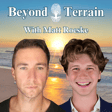
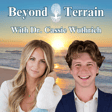
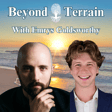
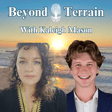
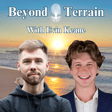
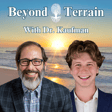

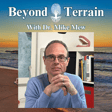
![DNA Doesn't Exist & Genomic Nonsense with Dr. Jerneja Tomsic [Part 2] image](https://media.zencastr.com/cdn-cgi/image/width=112,quality=85/image-files/652933f3a749dc383eb375de/ce5a5fd9-98c9-44fe-9b4b-3d0cd5abcf29.png)
